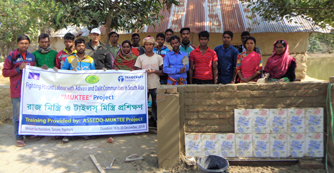RAJSHAHI, Jan 14, 2020 (BSS)- Twenty ethnic minority youths both male
and female were given a 15-day long mason and tiles-fitting training aimed at
making them competent for attaining self-reliance through income-generating
activities.
Agriculture Sustainable and Socio-economic Development Organization
(ASSEDO) and Tradecraft Exchange jointly arranged the training course in
association with ‘Fighting Forced Labour with Adivasi and Dalit Communities
in South Asia (MUKTEE) Project’ and European Union.
They also hosted a closing and certificate-giving ceremony for the
trained youths at Panchandar village under Tanore Upazila in the district
yesterday afternoon.
Upazila Chairman Lutfor Haider Rashid addressed the ceremony as chief
guest while Youth Development Officer Md Sadiquzzaman and Agriculture Officer
Shamimul Islam spoke as special guests with ASSEDO Executive Director Rabiul
Alam in the chair.
The speakers viewed that alternative income sources for the ethnic
minority people are very effective for freeing them from poverty and hunger.
They categorically viewed that the ethnic community people in the region
suffer a lot from absence of regular works because their ancestral practice
of selling labour in agricultural fields remains in only three months in a
year.
Lutfor Haider said alternative income sources for the ethnic minority
people can be the crucial means of ensuring their food security round the
year side by side with debarring them from various unemployment related
social crimes including drug addiction.
He urged the trainees for the best uses of the practical knowledge
acquired from the training in their respective working field properly.
Rabiul Alam told the meeting that around 4,000 ethnic minority people
including 2,000 women have been engaged in various income-generating
activities in 50 villages of Tanore in Rajshahi and Nachole Upazilas in
Chapainawabganj districts with the MUKTEE Project intervention.
A total of 1000 people from 2000 households are being brought under
need-based training on various trades and vocations like electrics, mobile,
mechanic, sewing, tailoring, computer operating, beautification, driving,
carpentry and building construction and decoration in phases.
Alam said the project is intended to address the systemic and structural
vulnerabilities of marginalized agricultural communities for eliminating the
menace of child labour and other humiliation.



